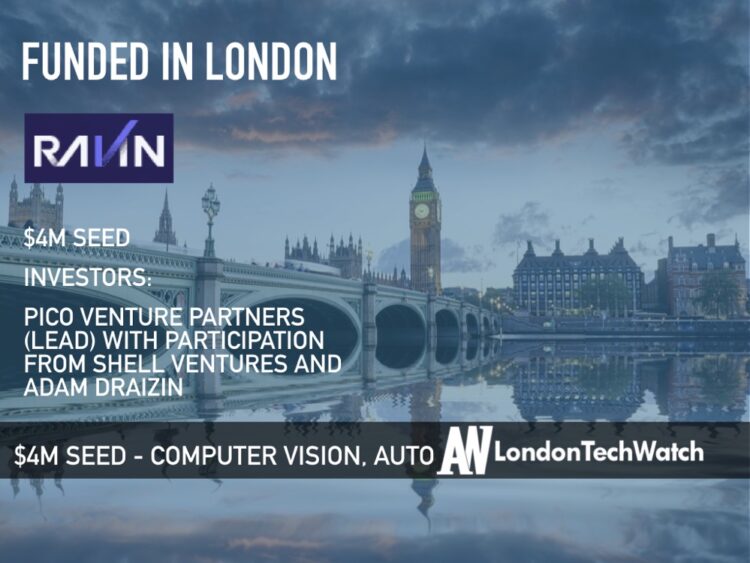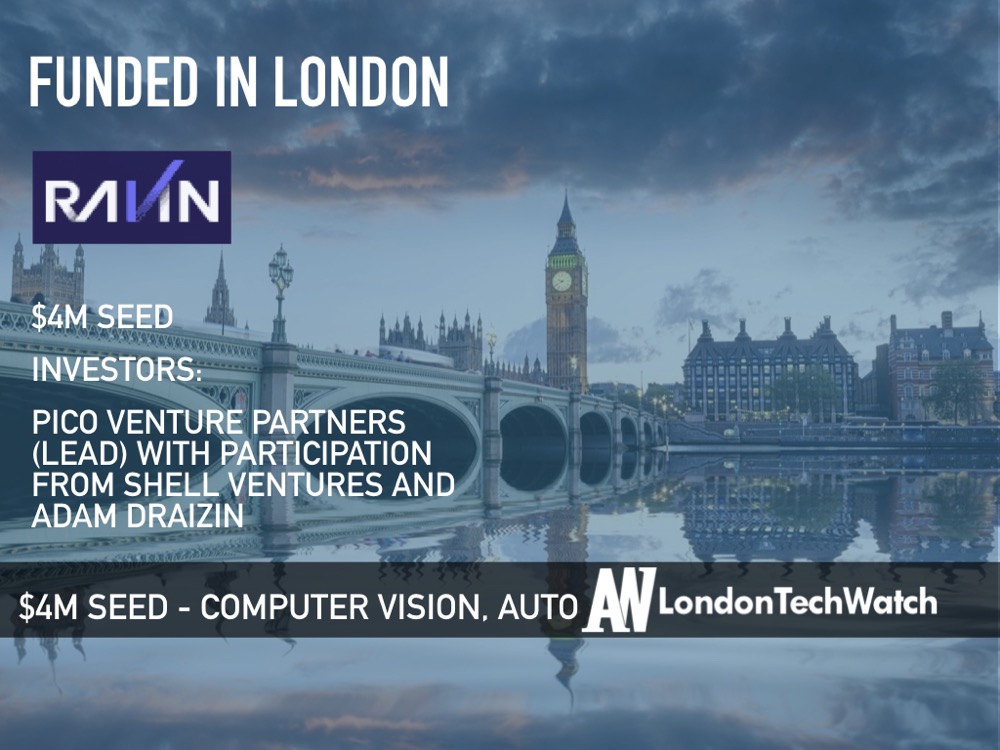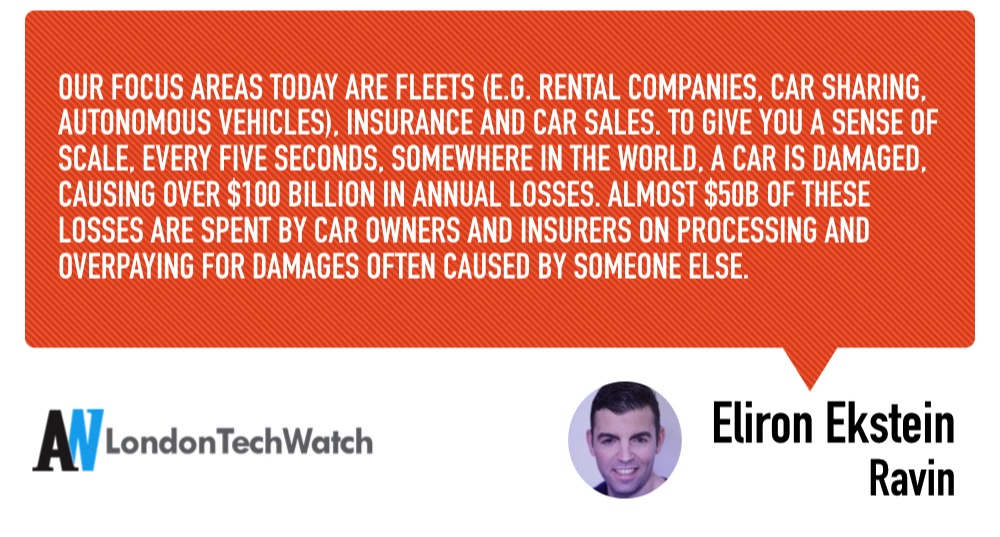Human bias is well documented and the flawed decision making that arises from this has been making headlines for centuries throughout society. Ravin is using uses computer vision and deep learning to fix this, starting with eliminating human bias when it comes to assessing vehicle damage. Through its patent-pending technology, the company’s software provides an objective, straight forward, and accurate vehicle assessment. All that’s needed is a mobile phone or CCTV installation to generate a verified 360° condition report. Already in pilots, the company’s algorithms are performing better than human inspectors.
London TechWatch chatted with founder and CEO Eliron Ekstein about this novel technology for damage assessment that will define the future of the insurance, autonomous vehicles, fleet, and car rental industries.
Who were your investors and how much did you raise?
Ravin has some amazing support from investors that know the automotive industry inside-out. PICO Venture Partners led the $4M Seed Round, with participation from Shell Ventures and automotive entrepreneur Adam Draizin. Shell brings scale through their global network and daily contact with millions of drivers.
Tell us about the product or service Ravin offers.
Ravin.AI uses computer vision and deep learning to provide automated condition reporting for vehicles. With our patent-pending technology, we are able to scan vehicles using standard cameras, either via a mobile phone or a fixed installation with CCTV cameras and provide our customers with a verified, objective, 360° condition report. Our algorithms can detect, categorise, and estimate a variety of damages, dirt, and defects on vehicles.
 What inspired you to start Ravin?
What inspired you to start Ravin?
The mobility industry is changing quickly. Shared usage models, on-demand rentals, autonomous vehicles, and online marketplaces are creating some really exciting options for consumers. But all these models rely on trust and right now that’s seriously lacking in the industry. By providing verified, objective condition reports, we’re bringing trust and transparency wherever vehicles operate or change hands. Think of Ravin as a bit like the DocuSign of the automotive industry.
How is Ravin different?
Firstly, we believe our patent-pending technology is the most advanced autonomous damage detection system for vehicles – one that doesn’t require huge training datasets and doesn’t require the user to point towards damage, hence being really objectivity. Secondly, we don’t rely on expensive specialized hardware. Our customers can use smartphones or standard CCTV cameras for physical locations to scan vehicles. Finally, we’re supported by some of the largest and most experienced players in the industry. They believe in our team and our mission.
What percentage accuracy do you think the integration of deep learning and computer vision in your use case has presently?
In a recent pilot at Avis Budget Group’s Heathrow site, our algorithms performed better than human inspectors. We are constantly updating and refining our models to improve our ability to detect damages and defects on vehicles.
What market is Ravin targeting and how big is it?
Ravin’s focus areas today are fleets (e.g. rental companies, car sharing, autonomous vehicles), insurance and car sales. To give you a sense of scale, every five seconds, somewhere in the world, a car is damaged, causing over $100 billion in annual losses. Almost $50B of these losses are spent by car owners and insurers on processing and overpaying for damages often caused by someone else.
What was the funding process like?
Our fundraising process was always focused on strategic value rather than just money. We were looking for those that can take us a step further, helping to execute on the great technology and finding the right channels to market. We were fortunate to have the backing of Shell – one of the world’s strongest players in energy and mobility – and now added Pico Ventures and Adam Draizin who add immense value in the world of the car rental and automotive aftermarket.
What are the biggest challenges that you faced while raising capital?
Finding the right balance between a good ‘deal’ and a good syndicate. It’s sometimes tempting to go for an offer that gives you higher valuation or better terms, but ultimately it is about the right partners to keep growing the company. We are fortunate to land a deal with such strong investors.
What factors about your business led your investors to write the check?
Hear it from the horse’s mouth: “We were drawn to Ravin’s outstanding team of business leaders and computer vision experts,” said Elie Wurtman, General Partner at PICO Venture Partners. “Automating business processes in automotive retail and rental environments will generate incredible value for consumers and the industry, and we believe that the Ravin team is uniquely positioned to drive this change.”
What are the milestones you plan to achieve in the next six months?
Over the next six months, we will be working to continue to refine our core technology and software platforms. We also have some exciting projects we’re working on with customers in Europe and the US. Watch this space!
What advice can you offer companies in London that do not have a fresh injection of capital in the bank?
Make sure the problem you’re solving is really clear. You need to make sure you know your customers better than they know themselves.
Make sure the problem you’re solving is really clear. You need to make sure you know your customers better than they know themselves.
Once you’ve got some traction, use the feedback you get to continue to refine and improve your product or service. If you’re solving a genuine problem people have and if solving that problem will provide your customers with real value, you’ve got a solid foundation for a successful business.
What is your favorite restaurant in London?
Escocesa on Stoke Newington Church Street. The courgette flowers stuffed with goat cheese and honey are out of this world.





